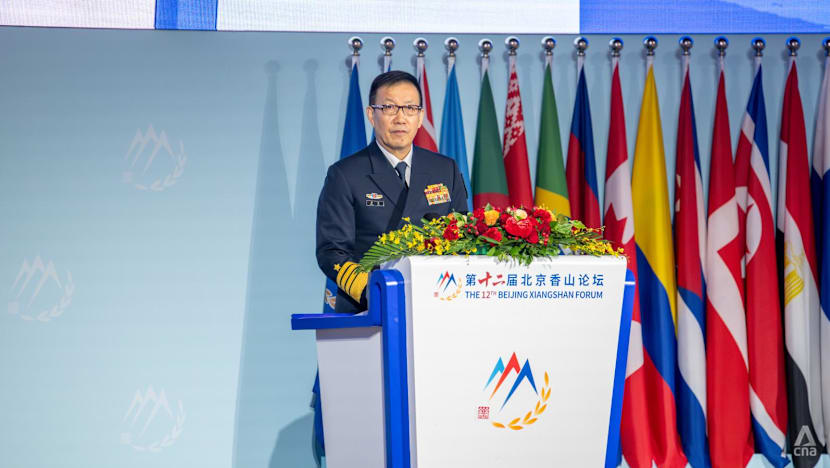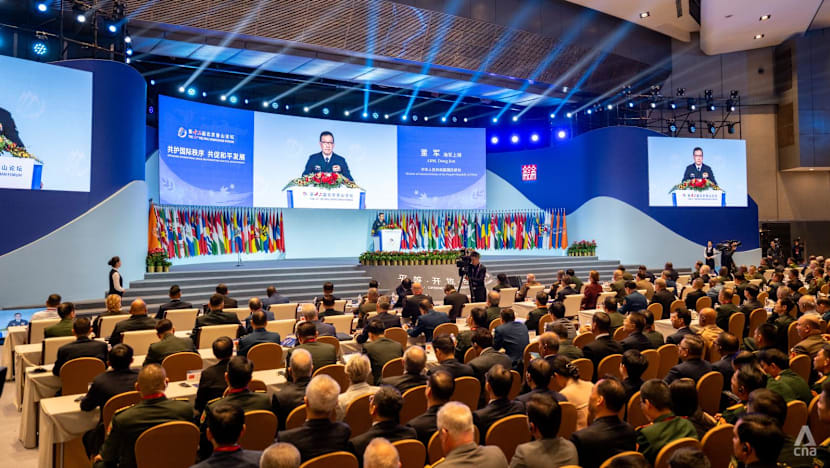‘Force for peace’: China’s defence minister makes case for stronger Chinese military
Chinese defence minister Dong Jun opened the Xiangshan Forum in Beijing on Thursday (Sep 18), attended by 1,800 delegates from nearly 100 countries.


This audio is generated by an AI tool.
BEIJING: A stronger Chinese military will be a stronger force for peace, China’s defence minister said on Thursday (Sep 18), also pledging to uphold the post-war international order and reject military blocs.
The People’s Liberation Army (PLA) will “resolutely defend the outcomes of World War II” and support the capacity of all militaries to defend their rightful interests, said Dong Jun, speaking at China's annual defence conference, the Xiangshan Forum, held in Beijing this week.
"The stronger the PLA becomes, the stronger the power to constrain war will grow, and the more assured world peace and development will be," Dong said.
Launched in 2006, the annual meeting has risen in prominence and is seen as a counterpart to other global security dialogues like the Shangri-La Dialogue held yearly in Singapore.
This year’s meeting will focus on global security governance, Asia-Pacific cooperation, safeguarding international order, and building regional peace.
The three-day event will see around 1,800 delegates in attendance, including military officials, diplomats and academics from nearly 100 countries like the US, Vietnam, Nigeria and Russia.
Also in attendance are Singapore Defence Minister Chan Chun Sing and Malaysian Defence Minister Mohamed Khaled Nordin.
In his 30-minute speech, Dong asserted that China’s military strategy is rooted in peaceful development as he rejected coercion and the use of force in state-to-state relations.
China also opposes military alliances and “exclusive blocs aimed at hegemony”, he said, adding that it favours non-alignment and “new security partnerships” that were built on equality, cooperation and mutual benefit.

Disputes should also be managed through dialogue, consultation and by addressing the root causes of conflict, Dong added.
“The Chinese military will act as a ballast for peace and stability, upholding the vision of permanent peace enshrined in the United Nations Charter,” Dong told delegates.
In his speech, Dong called for reforming and improving the global governance system, saying defence and security cooperation are essential to making the global order “more just and reasonable”.
He also cited President Xi Jinping’s new Global Governance Initiative (GGI) proposal aimed at reshaping the global order.
It was unveiled two weeks ago at the Shanghai Cooperation Organization-Plus (SCO) meeting in Tianjin, where the supremo called for a more just and equitable global governance system.
Pointing out how the GGI follows China’s earlier proposals of the Global Development Initiative, the Global Security Initiative, and the Global Civilization Initiative, Dong said: “These represent China’s response to world changes and global challenges, offering Chinese solutions.”
Dong’s speech underscored Beijing’s efforts to cast itself as a champion of multipolarity and a promoter of peaceful development, while positioning China as a counterweight to US-led alliances in the region.
It also comes at a time of sharper competition between Beijing and Washington, and amid growing tensions in the region.
"We support true multilateralism. Multipolarity is the trend of the times, but it must be equal and orderly, not a jungle of competing powers," said Dong, adding that China espouses a cooperative approach to multipolarity, where global affairs are discussed and managed by all countries together.
Calling Taiwan “an inseparable part of China, both historically and legally”, Dong said the island’s status was central to the international system created after World War II.
He added that the PLA was “a powerful force for reunification” that would never allow “Taiwan independence” separatism to succeed.
“Upholding the post-war order is not about rebuilding it from scratch but about strengthening its foundations. Taiwan’s return to China is part of this international order,” Dong said.
“We are always ready to defeat any external interference,” he added.
On the South China Sea, Dong said Beijing was working with regional states “to implement the Declaration on the Conduct of Parties and accelerate talks on a Code of Conduct”.
China’s actions to safeguard its territorial sovereignty and maritime rights, he insisted, are “a defence of post-war order and international law.”
He also criticised “some external countries” that cite freedom of navigation or “invoke biased arbitration to challenge basic norms of international relations”.
Chong Ja Ian, an associate political science professor at the National University of Singapore, noted Dong’s emphasis on region-led approaches.
“In contrast with this call for unity, he’s essentially saying that there should be a sort of prioritisation on regional actors, and so other actors that might have interests in the South China Sea, in Taiwan, should basically stay out,” Chong told CNA.
Dong’s invocation of multipolarity also carried implications for how China views its role in the region, Chong added, describing it as different from multilateralism.
"Multipolarity, historically, means you have big powers. They cover areas of the world in which they’re dominant,” he said. "That sort of idea of dominance, of presence, is something that Beijing would like to emphasise."
"The downside of that is it could cause a degree of alarm and concern among (China’s) neighbours, notably Taiwan, Japan, South Korea, the Philippines," he added.
"They could then take steps to try to counter and that could get us into a little bit of security spiral."
















